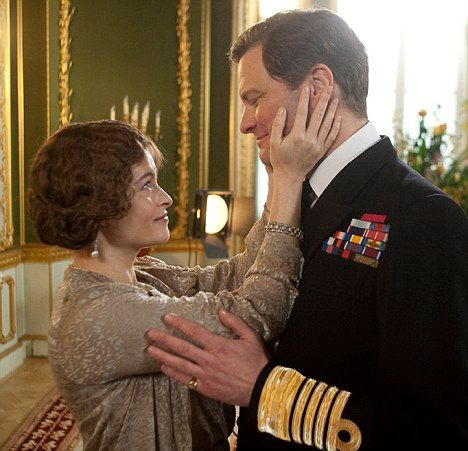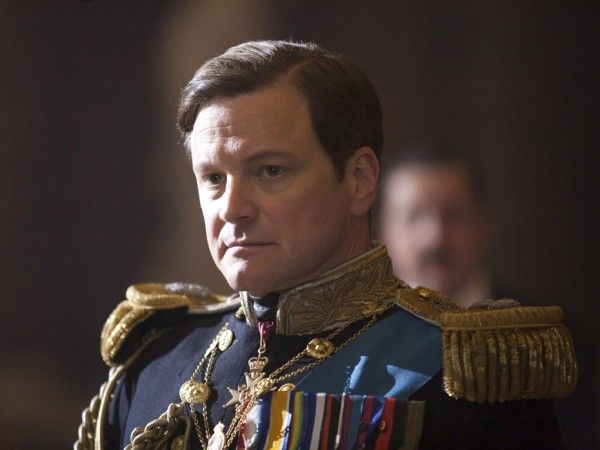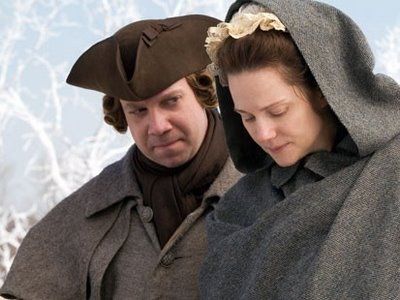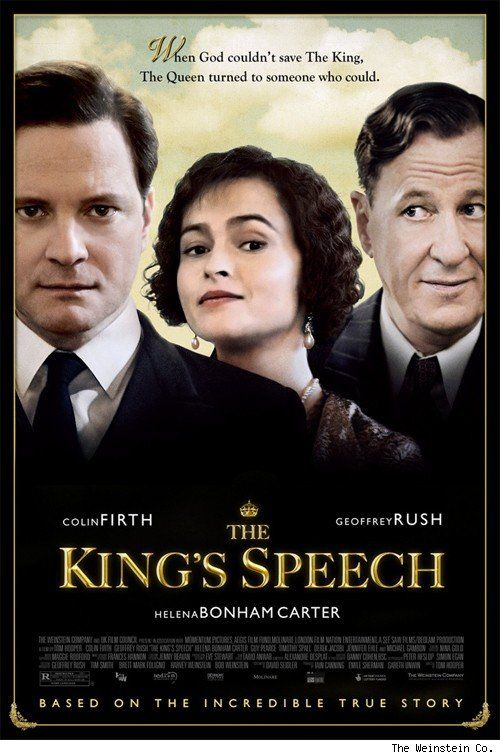Opening today, in limited release, is one of the best films of the year and something that’s absolutely getting nominated for every major award: director Tom Hooper’s The King’s Speech. I caught a screening at the Toronto Film Festival and was floored by how much I loved the film. In fact, after the Festival ended, only two films stayed with me: The King’s Speech and Darren Aronofsky’s Black Swan.
If you never saw the trailer, it's based on the true story of King George VI (Colin Firth) and how he overcame a debilitating speech impediment with the help of an eccentric speech therapist (Geoffrey Rush). The film also stars Helena Bonham Carter as Firth’s wife, and Guy Pearce, Derek Jacobi, Timothy Spall and Michael Gambon.
While I’ve seen a lot of great performances this year, Firth, Rush, and Bonham Carter are all at the top of their game and all three are getting nominations. Anyhow, I recently had the chance to talk with director Tom Hooper and after the jump you can either read or listen to what he had to say. We talked about casting, editing, film vs. digital, awards, working for HBO (he did John Adams), what he has coming up, and a lot more:
And one last thing before the interview. One of the many reasons why I loved The King’s Speech is the way Hooper shot the movie. Often when I watch a period piece, I’m left thinking that I just watched a Lifetime movie, or something that could have been on HBO on a Saturday night. But Hooper has elevated what could have been a simple story to something that absolutely belongs on movie screens.
Of course having incredible performances from Firth and Rush help elevate the material, but his use of selective close-ups and interesting camera angles made the story came to life. Again, The King’s Speech is one of the best films I’ve seen this year and it’s absolutely worth checking out.
As usual, I'm offering two ways to get the interview, You can either read the transcript below or click here to listen to the audio of our phone conversation. Finally, you can also watch some clips from The King's Speech here.
-
Collider: Are you enjoying your weekend of press?
Tom Hooper: [laughs] It feels like it gets more brutal as the years go by and not less. Just the amount and intensity of it. But the good thing is that it’s an interesting film to talk about, and there’s a lot to talk about, which is nice.
I saw your film at the Toronto International Film Festival and I absolutely really loved it. Everyone I speak to who sees the movie…I haven’t heard a bad word. Are you dumbfounded by the critics and everyone jumping up and down for it?
Hooper: It has been a pretty astonishing and overwhelming response. I mean, there’s no way you can predict this kind of response because it has been overwhelming. Particularly in the first two festivals – Telluride and Toronto – where it started. It was extraordinary and amazing. I spent months locked in dark rooms and you hope that it will play well, but you can never expect that kind of reaction. What I really like is sitting with audiences and it really makes people laugh in such a common way. It really makes people cry and it transports people. I find that after a screening, people really want to come and tell you what they feel. They feel really passionate about it, and that’s fantastic.
A lot of period movies feel like you could be watching them on the Lifetime channel. They have no cinematic depth. But your movie has a lot of cinematic depth and it belongs on a movie screen. Can you talk about what you did as a director to prepare so that it would be cinematic and not something that you would want to watch on Lifetime?
Hooper: That’s interesting. I think one of the things I worked on early was the close-up because of the amount of dialogue and the nature of the emotions that Helena was going to go through. The film’s language was going to be the close-up. There’s no point fighting that because the cinematic close-up was going to be key. So therefore, I thought a lot about how to make the close-up cinematic. Because it can be frustrating shot to frame because in composition terms, it’s the face. If you look at classic Hollywood films, they tend to shoot close-ups on quite long lenses and the background it out of focus. You know, it’s just a mush. So I decided early on that I would consider shooting the close-ups on wider lenses in all. What that does is that, even in the close-up, it draws the art direction and set location into the frame. And the face still remains in communication with the space, which I think is more cinematic. There was particularly a French film I saw years ago called Man Against the World where there were these wonderful simple frame close-ups against wallpaper in a room, which were incredibly powerful. I think of Wong-kar Wai in 2046, who does simple compositions of people. It’s a futuristic movie, but he can shoot someone in mid-shot in a hallway, and the texture of that always fascinates me. It feels very cinematic. More than that, I also began to think, “What is the visual analog? It’s stammering. How do I find a way to shoot Colin that will underline his predicament?” I began to think that if you’re a stutterer, it’s about inhabiting silence, emptiness, and nothingness. Therefore, is there a way visually of talking about that? So I wanted to put Colin’s face in these close shots in constant relation to negative space. So I used these big empty walls in the consulting room in Logue’s apartment and framed Colin against these big empty walls. Sometimes, he’s small against in the corner with the wall above and overpowering him. Sometimes, there’s just a lot of head room. I like that the idea of the conversation and communication behind nothingness is blasted all in the therapy room. Then, if you look at what I’m doing on Geoffrey’s side, Geoffrey is against in the therapy room…it’s sort of a room like a fireplace. It’s all of his pictures, wall, and papers. It’s domestic and it’s cozy. I watched them make that kind of division in the close-up language between these two men and the worlds they came from.
Can you talk about the editing process? How long was it for you in the editing room and did you do test screenings or friends and family screenings?
Hooper: We finished shooting the film in late January of this year. Tariq Anwar is a superb editor. I mean, he cut American Beauty and The Madness of King George. He’s hugely experienced. I think the rhythm of his editing is astonishingly good. We had a pretty good cut probably 7 or 8 weeks out from the shoot. We tested a cut in New York in April with Harvey Weinstein and we actually got a 93 percent on our New York test, which is very rare I’m told. So I then said to Harvey, “Maybe this is a New York sophisticated thing? I want to know if this plays in somewhere unlike New York” So he set up a test screening in Kansas City and extraordinarily the same result came back with 93 percent in terms of audience response. But I found that test very useful because there were definitely things about the history that people didn’t know. For example, the audience didn’t even know that Wallis Simpson was American unless if you pointed it out. So I definitely had to deal with the work to make sure that the history side was clear because I think I was assuming more knowledge that people had. So the testing process was both very encouraging because of our scores, but also helpful in terms of the clarity of the storytelling. I think we locked up our edit in early May. So it was a good rhythm. It was okay.
This is sort of a jokey question, but the last few people that have worked with you have all won Golden Globes. Basically, actors that work for you win awards. Are you sort of just going to start printing out cards or something reminding people when you are looking to cast?
Hooper: If you look at the cast I assembled for this, it’s such great actors in really quite small roles. Like, Sir Michael Gambon came in for two scenes. You know, I got Timothy Spall to come in for three scenes. I think what happens is that actors get quite loyal to you. There’s loyalty with people that you’ve worked with before. My two great loves when I’m shooting are working with great actors and composing images. I love being around particularly great clever actors. So I just hope that if this continues to happen, it will just help encourage other good actors I can work with so that they can perhaps work with me.
I really enjoyed your work on John Adams. Can you talk about the involvement you had on that show and working with HBO?
Hooper: Well, I directed all 9 hours of it. So it was my 18th century Lord of the Rings except I didn’t have armies of Orcs to contend with. It was a vast show. It was an extraordinary privilege to be making this thing knowing that it was going out during the U.S. primaries and knowing that there wasn’t much else being made. I had this opportunity I felt with the show to trace back this origin of this incredible schism in American physical values and see if you could trace this divide back to the personalities of the founders. I think that HBO is an extraordinary entity in that it was willing to spend over a hundred million dollars in telling the story of the non-famous founding father. Because let’s not forget that before the miniseries, John Adams was the kind of guy who was not on the pedestal. He was not iconic in the way that Washington, Jefferson, and Franklin were. Adams knew that in his own lifetime and I loved the subveresiveness of that. In some ways, there is a quality in my work where I like choosing the subversive way to these famous iconic stories.
I think that the series is tremendous. Have you talked to HBO or others about doing another miniseries on that level or was the time involved just so great that you’re almost apprehensive to go back?
Hooper: I have already started talking to them about something. It’s not for the immediate…it’s a little bit down the line, but I would definitely go back. But I hope that the industry is maturing to the place where there is not a snobbery distinction between film and television because it’s about the story. If your story is John Adams, you can’t tell it as a movie. You need 8 or 9 hours to do it justice. If the story is The King’s Speech, it tells beautifully as a movie. I think that you need to pick the medium for the story and not try to shoehorn big stories into films, and equally not try to stretch out the same stories into 8 hours. I think that’s the right way to be.
I read a quote of yours where you are basically mentioning how English TV was so amazing a few decades ago and how American television has really now stepped up. I would argue that is probably the golden age of TV with the abundance channels and the stories you are able to tell.
Hooper: I mean, The Wire was the most phenomenal achievement. You know, in terms of an anatomy of an urban culture in America told over 70 or 80 hours. I do think it’s in large part down to HBO. I don’t know if you know, but the founder of the BBC, Lord Reith, had this idea that television is here to inform, educate, and entertain. This is something that commercial broadcasters haven’t really embraced. HBO almost seems to be adopting those wonderful ideals of the early BBC. That it’s not about just entertainment. It’s about educating and informing, and yet doing it while making a ton of money for its shareholders. It seems to have squared the circle. Growing up, I tended to think that if you’re being commercial you couldn’t be intelligent. Or if you’re being commercial, you couldn’t educate or challenge. And HBO always had that confidence that you can. In some ways, the way I made The King’s Speech shows my confidence. What HBO taught me in terms of America was that there’s a very large clever audience out there, and you don’t need to talk down to them. HBO never wanted me to simplify anything because they were worried that audiences wouldn’t understand it. HBO always assumes that their audience is bright. I like working with that assumption and The King’s Speech is made with that assumption. I hope that if it is successful it proves that there is a bright audience out there that is big.
I definitely have to address this with you. I’ve covered movies for a number of years now, and I’m beyond confident that your film is getting nominated for Best Picture. Your actors are going to get recognition and you're going to get recognition. It’s a very special movie. Can you talk about how you’re heading towards that line? I don’t mean to put it out there or jinx anything because your film is unjinxable.
Hooper: I kind of want to take it everyday as it comes and not make any assumptions. You know, I’m just thrilled at the response we’ve had and the awards we’ve won. The Audience Award at Toronto was an unbelievable thing to win - to be voted by in a popular vote. At the moment, I just hope people go see it when it gets released on Thanksgiving and that people discover it because I know that it’s a really entertaining, absorbing, humorous, and moving night out at the cinema. Having seen how profoundly people respond to it, I would be crazy to not want everyone to see it. You know, it’s very democratic. I mean, it plays the same in England as it plays in America as it plays in Canada. It’s equally funny to lots of different audiences and it seems to make people cry, whoever they are. I think that it’s very special when you have one of those films that seems democratic that includes everyone instead of excluding some people.
I definitely want to know your thoughts on 3D. Do you view as a gimmick or do you view it as something that is going to be here to stay for awhile? Are you thinking about maybe doing a period piece or a future project in that format?
Hooper: I think it’s here to stay. I can’t say this for America, but in England, if you look at investment Murdoch has made on Sky Television to bring 3D TV into the mass marketplace. That’s a pipeline that is going to need feeding. With people making that kind of investment, I think it’s here to stay. I suppose, for me, good films create the illusion of 3D anyway. I mean, when you’re watching The King’s Speech, you don’t keep going. “…but this is only 2D.” You know, because if you’re inside the story, you forget all that. It becomes very real to you. So I think that not every film will end up being made in 3D. I think that it will always be types of films that are best served. But I do think it’s a huge exciting new development. If it helps rejuvenate the cinema, which it appears to be, that’s only good.
What are your thoughts on film vs. digital?
Hooper: Well, it’s interesting. I still capture on film. This is shot on 35mm. I’ve never actually yet shot on digital, but I am a fan of digital cinema projection. So my favorite route is to capture on 35mm and to project digitally because of the consistency of this digital projection system and it’s faithfulness to the way I graded it is so impressive. I was with Ridley (Scott) on Friday and we were talking about it. He was saying that he’s a convert to digital projection as well just because it’s much more faithful to the way you want to see the film come out.
Can you talk about the casting process? Did you get your first choices and can you talk about those initial meetings?
Hooper: I think with Colin, I was just very lucky that I ended up with the right man doing it. I think that the success of the film is a real testament of him being the right cast. I’m such a believer that you got to get the casting right. Not 10 percent off, but true and right. It’s tough to do because there’s only a certain number of actors who can attract the finance and who are also great. But I think that across the board, but in particular those central choices of Helena, Colin, and Geoffrey there’s something very right about them, which is why I think the film is playing well.
What you are thinking about for future projects? And has the success of the movie lead to you having more meetings in “Hollywood”?
Hooper: I mean, I have a ton of scripts sent to me. At the moment, I’m frankly struggling to catch up. I’m reading through all of the scripts. So I haven’t decided on what I’m going to do next, but my first job is to catch up on the reading that I’m behind on.
Has it lead to you all of a sudden having more meetings at different studios?
Hooper: Without a doubt.
Have you enjoyed it or is it like being the one that everyone wants to date?
Hooper: I haven’t thought about it like that. Yeah, but the problem remains that it’s hard to find great scripts and great material. The truth is that The King’s Speech, which is great material, people weren’t lining up to finance it. It was thanks to people like Harvey that it did get financed. I’m not naïve, there’s maybe material that I want to do that is still hard to finance. So I think that it remains that whatever success you have, it doesn’t necessarily mean your films can be financed easily.





